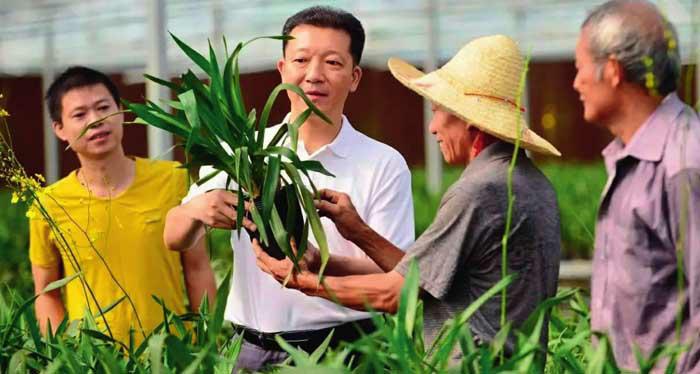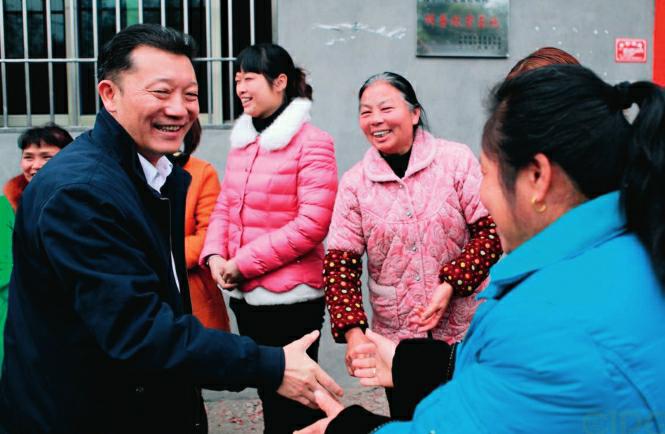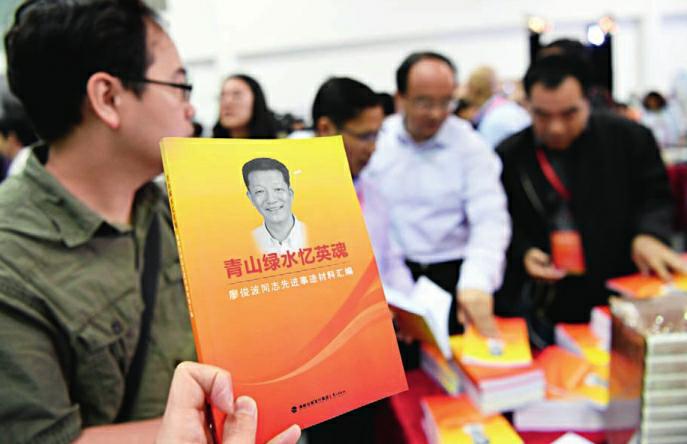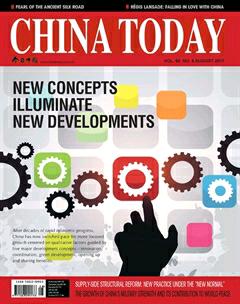Why Millions of Chinese Love and Admire Liao Junbo
By+staff+reporter+LU+RUCAI
LIAO Junbo is a true commu- nist. Everything he did was for the wellbeing of his people. He pursued a dream, which is what the Chinese Dream is about.” This is just one of a deluge of eulogistic comments posted on the website commemorating Liao Junbo.
Liao was vice mayor of Nanping City, Fujian Province, and also a member of the standing committee of the municipal committee. He was killed in a car accident last March while on duty. Within days more than 400,000 people had expressed shock and sadness at the news on WeChat, and condolences continue to stream in to his memorial website today.
President Xi Jinping called on all CPC members and officials to learn from Liao Junbo. What was it about this local magistrate that made millions of Chinese love him
A “Foreman”
Liao Junbos daughter Liao Zhiqi, who is to start postgraduate studies in the fall, remembers how a classmate asked her what her fathers work was, and she replied “a construction foreman.” Thats how her father described his work.
In 1995 Liao, then a 27-year-old middle school physics teacher, was sent to work in the general office of the munici- pal CPC Committee of Shaowu. Three years later he was appointed magistrate of the citys Nakou Town. In the ensuing years he was transferred to different posts in local governments at various levels, and also in an industrial consortium. At the time of his death he was vice mayor of Nanping and director of the Administrative Committee of Wuyi New District. In these establishments it was always Liao who oversaw the construction of infrastructure. He witnessed the completion of four industrial parks, half of the new district, and a long list of roads and bridges.
In 1998 Nakou Town was ravaged by floods the like of which had not been seen for a century. Rather than giving orders from his office, Liao spent days and nights at the forefront of disaster relief effort, making individual visits to the hundreds of affected families, and joining in the rebuilding of their homes and other rehabilitation efforts. By Chinese New Year 1999, all the 500-odd families who had lost their homes in the deluge had been re-housed.
In October 2007 Liao was appointed chief of the Administrative Committee of Ronghuashan Industrial Consortium. Proceeding from the modest RMB 20 million start-up fund, he and his colleagues toiled to raise funds and solicit investment for various projects. Their efforts were eventually rewarded with the construction of an industrial park that generated an output value of billions of RMB.
Liao was Party secretary of Zhenghe County from June 2011 to November 2015. Prior to his arrival Zhenghe was the least developed region in the province, and being posted there was regarded as an officials worst nightmare.
But Liao got on with the job regardless. For the first two months he and his colleagues visited local villages, urban communities, factories and mines, and carried out extensive field studies to become acquainted with local conditions. In the process he began to map out in his mind a development plan for Zhenghe. What he envisioned was beefed up industries, urban planning and tourism on the basis of modern agriculture.
Zhenghe had missed out on the dazzling modernization drive underway in other parts of the country at that time. It had not a single expressway, or decent highway or bridge. It was a backwater that even lacked traffic lights and crossings. During Liaos five-year tenure the county changed beyond recognition. The urbanization rate rose from 31 percent to 46 percent, and construction of a boulevard, a city plaza, a cultural center, nine bridges and two expressways took place. Liao also helped to establish Tongxin Industrial Park, whose focus was on the bamboo/timber processing, food and machinery.
At present the park accommodates 57 businesses, 37 of which went into operation. Last year its industrial revenue hit RMB 1.5 billion, and its workforce exceeded 3,000 people.
By 2012 Zhenghe had climbed to the 35th slot of the economic development index list of all Fujians counties, so scoring the biggest advancement of all. From 2013 to 2015 it remained among the provinces top 10 county-level economies. And from 2011 to 2016 its revenues soared from RMB 160 million to RMB 450 million.
The Right Person in the Right Post
Wei Changjin, vice chairman of the Zhenghe County committee of the Chinese Peoples Political Consultative Conference (CPPCC), recalled that after taking office Liao set two redlines for Zhenghe officials – diligence and solidarity.
At the time the county was still reeling after the arrest and conviction of a former Party secretary for corruption, an affair that eroded the morale of local officials. Liao saw the need to reform the mechanism for selecting and promoting officials to allow the most capable and pioneering ones to come to the fore. Under his direction, the county set up 11 work teams on the development of different sectors, among them urban economy, industry, and tea plantation. They were then placed at the disposal respectively of leaders of the local CPC Committee, Peoples Congress, government, and CPPCC.
Meanwhile Liao introduced a reward system to evaluate local officials every year. The winners received cash bonuses and promotions, and those who failed to perform satisfactorily were removed from their posts. To those who knew him, Liao was a suave man with a kind heart. But he managed his team with an iron fist. In his first year in office in Zhenghe Liao reshuffled the leadership of eight agencies.
Liao valued cadres who had practical experience and performed their duties efficiently. Of the 128 officials he appointed and promoted from June 2011 to March 2016, 70 percent had worked in major programs, key positions, or at grassroots agencies. Under Liao, local officials were more motivated and devoted to their work.
Liao laid great store by appointing the right person to the right post. Xu Shaowei was vice chairman of Zhenghe County Peoples Congress when Liao invited him to take concurrent charge of the countys infrastructure sector. Xu demurred, protesting he was too old and gray for the post. When next day Liao visited him he brought along a bottle of hair dye. Amused and won over, Xu accepted the offer.
Lin Jun, Liaos driver since 2004, recalled that Liao often lamented, “How nice it would be if there were 48 hours in a day.” In the more than 10 years that Lin worked for Liao, they had driven 800,000 or more kilometers. In four years alone during the preparation and construction of the Ronghuashan Industrial Consortium, they clocked up 360,000 kilometers.
“He told me he hoped I would be his driver until my retirement,” Lin recalled. But this was one instance where Liao didnt keep his word.
As part of the government reform, Nanping decided last December to trim its fleet of official vehicles by 65 percent. Apart from the highest ranking officials, public servants would have to manage without cars and chauffeurs for their exclusive use. This meant most drivers would either be transferred or laid off. Lin Juns colleagues were sure he would not face such uncertainties, because he was Liaos driver. But to their surprise, Liao approached Lin before the reform plan was made public. “As a leader of the municipal government, I must set a good example in the reform,” he told his driver. Lin was later transferred to the forestry administration of Yanping District, Nanping City.
“Small Fry”
Liaos wife Lin Li is a middle school teacher. She never called him before 11:30 pm, because he was usually still working until then. “If he didnt show up after 11:30 pm, I would leave a message on WeChat. He might call me back if he had finished his work, or otherwise text “busy.”
Liao told his wife that when he retired he would spend all his time with his family and take over the household chores– “washing, cleaning and cooking – everything.” He also promised to take his wife and daughter on holidays to see the wider world. But this wasnt to be.
On the weekend of March 18, 2017, Liao had a hurried dinner at home after a meeting at the municipal government. It was raining heavily, but he had to go to another meeting in Wuyi New District. For days he hadnt returned from work until the early hours of the morning. Lin Li tried to persuade him to put off the late meeting the next day, but Liao said the schedule could not be changed. One hour later Lin received a call about the car accident. She broke down in front of his colleagues: “If only Id insisted. If Id quarreled and fought with him, he might still be alive.”
After the news of Liaos death broke, 100,000 people expressed shock and sadness via the Internet within five hours. As too many local residents wanted to attend his funeral, officials had to dissuade them. Nevertheless approximately 1,000 people showed up at the Nanping funeral parlor on March 24 to bid Liao farewell. Among them were Liaos colleagues, friends, businesspeople whod invested in the region at Liaos invitation, and the local citizens he had served.
“Its wonderful to help the 230,000 residents of Zhenghe live a happy life.”This was the dream of Liao Junbo as Party secretary of the county. And he was approaching its realization. Three years after he took office, 30,000 people in the county had been lifted out of poverty. In June 2015, Liao was voted an outstanding county Party secretary, and received by President Xi Jinping. On June 6, 2017 the CPC Central Committee granted him the posthumous title“Model CPC Member of the Nation.”On June 20 the Committees publicity department conferred on him the honor of “Role Model of the Time,” and exhorted all Party members to follow his example.
“All Party members and cadres should learn from Liao Junbo to stay faithful to the Partys mission, work diligently and selflessly for public interests, practice and deliver the Partys policies and principles to the grassroots and the people, and genuinely work for the peoples wellbeing.” These were President Xis comments after Liaos death.
Lin Li remembered how, when Liao was magistrate of Nankou Town, their daughter asked him: “Dad, are you the biggest fish in town ” Liao told her: “No, dad is small fry in town, as I work for all the people here.” In his political career of 20 or more years, he remained a humble public servant. There are many more like Liao Junbo across China who, in various positions and realms, contribute to realizing the Chinese Dream.

